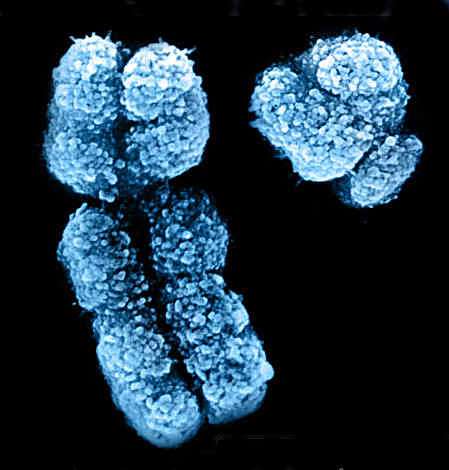 |
| This picture above shows one X chromosome and one Y chromosome |
When I started trying to make a decision for this blog post I started thinking about different things I'd be interested in but I was having a hard time making a decision. Nothing was really sticking with me. I then thought about it and remembered how often I joke about how men disappearing and I realized I did not actually know what was happening with the Y chromosome and if men would actually disappear. When I did realize that I decided that I wanted to learn more about it.
X and Y chromosomes are sex chromosomes and determine the sex of offspring. Typically, the Y chromosome belongs to biological males along with an X chromosome, although there can be different exceptions to this rule, such as XXY, XXX, and more. The Y chromosome is much smaller than the X chromosome (as seen in the picture above) and carries about 55 genes. In comparison to the X chromosome, this is quite insignificant as the X chromosome carries about 900 genes. The Y chromosome and its decreasing size have led to the question: Is the Y chromosome disappearing or has it reached a stopping point and continue to exist in its much smaller form?
The Y chromosome has been rapidly decreasing in size for a very long time and if it continues at the same rate it will be gone in 4.6 million years. The Y chromosome used to be roughly the same size as the X chromosome but has steadily been losing much of its genetic information. The chromosome includes the very important SRY gene or "master switch" gene. The SRY gene is responsible for inducing male sex determination. The Y chromosome still has this gene although it has lost many others. Another gene on the Y chromosome would be the PRY gene that is associated with infertility.
 |
| This diagram shows the Y chromosome and the SRY gene |
The reason the Y chromosome has been subject to this degradation is due to its inability to recombine, or when two chromosome exchange genetic information that leads to a different combination of alleles. This is because it does not come in a pair and is only passed down from the father. The lack of genetic recombination means that there is less protection from genetic mutations, good and bad.
Although there are a few ways the Y chromosome has evolved to combat these changes. It seems that the Y chromosome has a lot of structural rearrangements that allow for "gene amplification", which is when there are multiple copies of genes that aid the Y chromosome in slowing down gene loss. Y chromosomes also have developed palindromes or DNA sequences that are read the same way backward and forward, this development has also helped to stop further degradation.
It is possible that the Y chromosome will not degrade much further due to the mechanisms it has developed to better survive over time. It is also possible that the Y chromosome will disappear, although this does not mean that there will be no male humans anymore as men are needed for reproduction. The Y chromosome may just disappear from the population like it did for mole voles.
 |
| A mole vole is an example of a creature with no Y chromosome |
Mole voles all have a singular X chromosome. It was first theorized that maybe the SRY gene went over to the X chromosome but after studying mole vole's chromosomes, scientists have seen that there is no SRY gene. That could mean that another gene was mutated to determine the sex of these animals and so there was no longer a need for the Y chromosome.
If the Y chromosome does in fact disappear this would not mean that all men would disappear. The SRY gene would most likely move to a different chromosome. This would mean that humans would no longer have a use for a Y chromosome and the SRY gene would be on the X chromosome. So yes the Y chromosome will disappear, but the world may still be stuck with men.
Very interesting post! I had definitely heard about the disappearing Y chromosome, but it was super cool to learn about how and why it was shrinking.
ReplyDeleteI had no idea that the Y chromosome was disappearing and has already disappeared in mole voles! I wonder if human's Y chromosome will disappear or stay its current size.
ReplyDeleteI had never heard about the mole voles and their disappearing Y chromosome–that is so cool! It is really interesting that the SRY gene would just move to another chromosome
ReplyDeleteThis was really interesting to read about. I haven’t read much about the Y chromosome disappearing, so it was cool to learn more about it.
ReplyDeleteI loved reading this! It’s so crazy to think about
ReplyDeleteI loved reading this! It’s so crazy to think about
ReplyDeleteI loved reading this! It’s so crazy to think about
ReplyDelete